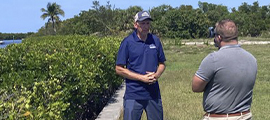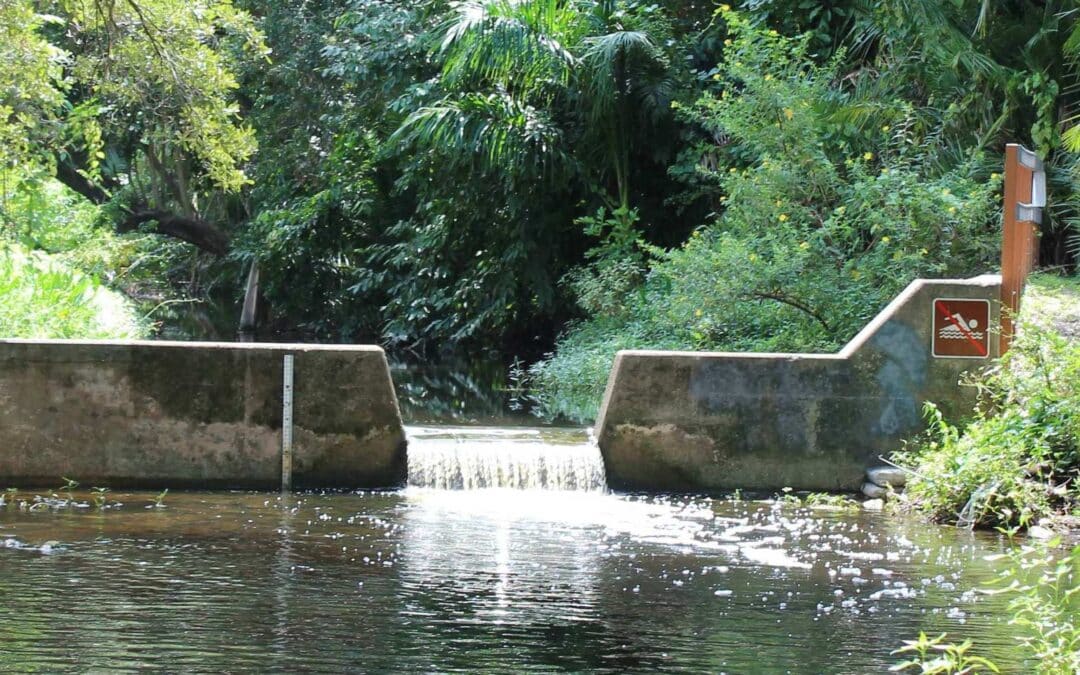Creek runs along Fort Myers landmarks where children, families gather and play
Op-Ed originally published in the Fort Myers News-Press by Codty Pierce on July 7, 2024
As the Calusa Waterkeeper, it is my duty and that of our organization to protect and restore our local waterways and ensure they remain safe for public health and the enjoyment of all. Calusa Waterkeeper aims to work collaboratively with local and state authorities such as the Florida Department of Environmental Protection (FDEP) and city and county governments on water quality issues, but will fight for clean water, enforcement of regulations and policy change when necessary.
This alarming trend of bacterial contamination poses a significant threat to public health, and it is imperative that the issue is addressed with urgency and determination. Manuel’s Branch runs along vital community landmarks where children and families gather and play. The risks associated with drinking, swimming, or fishing in these waters are serious.
Fecal contamination in recreational waters is associated with an increased risk of gastrointestinal (GI) illness and less often identified respiratory illness. Human and non-human fecal pollution presents various risks from several bacteria and viruses. This is a situation that no community should have to endure, and it is our authorities’ responsibility to act swiftly to mitigate these risks.
Sadly, local waters such as Billy’s Creek and Manuel’s Branch have long suffered from fecal indicator bacteria and other impairments. The public data goes back as far as 2001, if not further. FDEP was preparing to assess Billy’s Creek for bacterial TMDL back in 2008, and should have been prioritizing Manuel’s Branch too, but never did.
Over the years, the City of Fort Myers has had a series of minor and major sewage spills. In early 2021, the Florida Department of Environmental Protection brought the most recent consent order against the City of Fort Myers, meant to address these problems.
In the consent order, both parties agreed on many wastewater violations, the likely human source(s) of surface water contamination, and corrective actions to be taken by the City of Fort Myers. Now into the fourth year of their increased monitoring plan, little change in bacteria levels has been recorded as seen in the city’s own data and Calusa Waterkeeper’s independent sampling. Despite the in-kind projects and proposed infrastructure improvements proposed by the city as part of the consent order, no real change or improvement has been shown within Manuel’s Branch.
The City of Fort Myers’ own E. coli data, gathered from 2017-2023 at the Manuel’s Branch Neighborhood Park, shows an average count of 1,667 MPN and an upwards trend in that timeframe. Florida state statute sets the regulatory thresholds at a one-day limit of 800 MPN and a ten percent total value (TPTV) of 410.
Calusa Waterkeeper’s enterococci data for Manuel’s Branch from 2021-2024 has always come back well above the Florida Department of Health and EPA’s Beach Action Value of 70 MPN and the FDEP’s regulatory threshold of 130 MPN. The average value over the last year of our independent sampling along Manuel’s Branch has been 2,579 MPN, with the highest reading of 15,531 just recorded in April of 2024.
Calusa Waterkeeper has engaged the FDEP and City of Fort Myers to work together and ensure accountability in addressing this pollution threatening public health. In the meantime, it is essential for residents to take precautionary measures to protect themselves and their families, as there are no consistent laws or efforts in how officials should post and notify the public about these risks. Here are some guidelines to follow:
1. Avoid contact with the water: Do not drink, swim, or fish in Manuel’s Branch until the water has been declared safe by authorities.
2. Stay informed: Follow updates from Calusa Waterkeeper and local health officials regarding the status of water quality in Manuel’s Branch.
3. Report Symptoms: If you or your family experience any symptoms of illness after coming into contact with the water, seek medical attention immediately and report your condition to local health authorities.
Our objective at Calusa Waterkeeper is to continue working diligently to compel source tracing of this pollution and ensure that authorities implement effective solutions to reduce it. We are committed to protecting our community’s health and ensuring that our waters are safe for all to enjoy.
It is time for the City of Fort Myers to take responsibility and act decisively to address this crisis. We call on the community to support our efforts and to remain vigilant as we navigate this challenge together. The health and safety of our residents depend on our collective action and unwavering commitment to resolving this issue.
Capt. Codty Pierce is the Calusa Waterkeeper. You can learn more about our Fecal Indicator Bacteria sampling program at calusawaterkeeper.org/issues/bacteria-monitoring/
Continue Reading

























